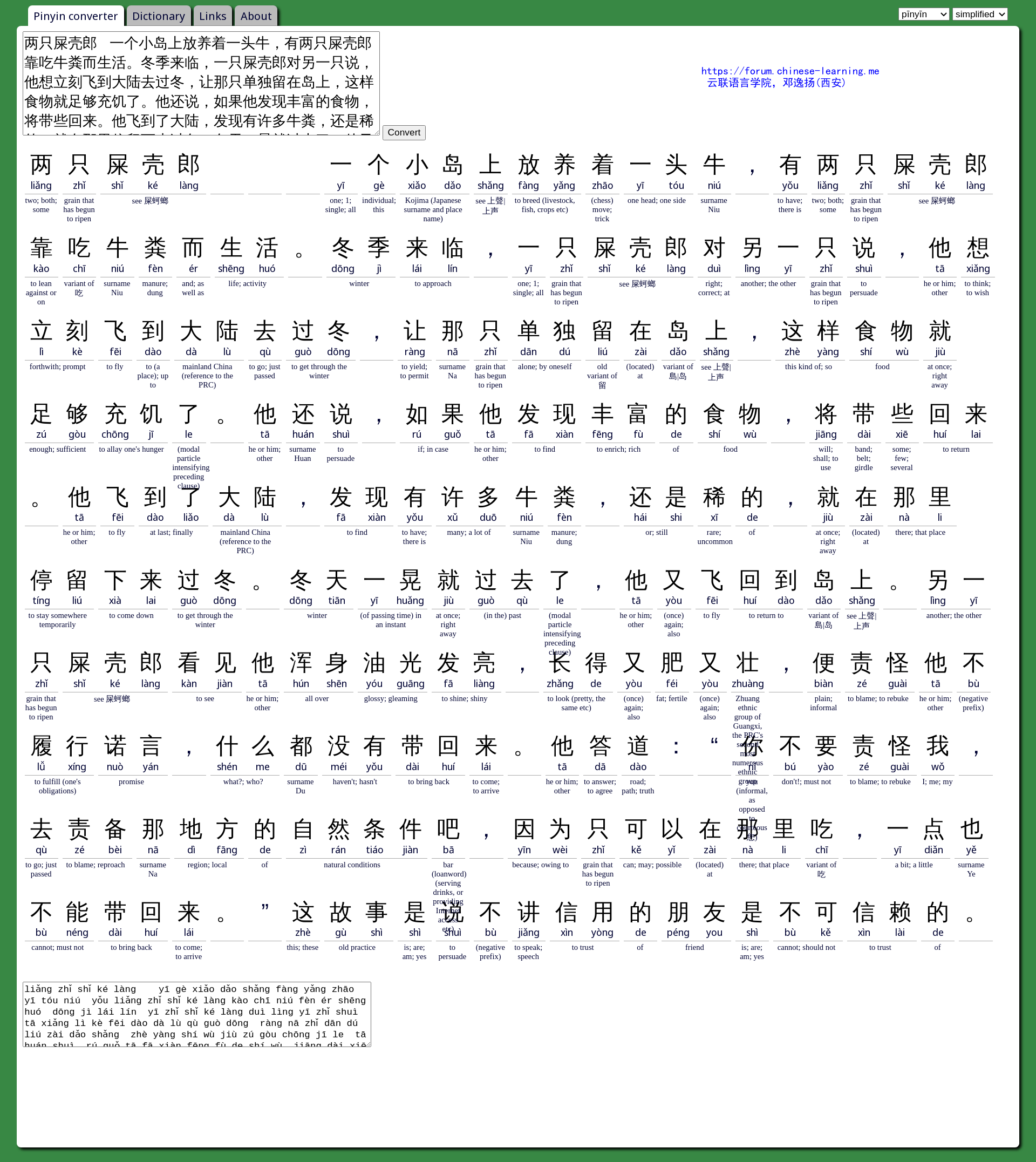
Show Pīnyīn
一个小岛上放养着一头牛,有两只屎壳郎靠吃牛粪而生活。冬季来临,一只屎壳郎对另一只说,他想立刻飞到大陆去过冬,让那只单独留在岛上,这样食物就足够充饥了。他还说,如果他发现丰富的食物,将带些回来。他飞到了大陆,发现有许多牛粪,还是稀的,就在那里停留下来过冬。冬天一晃就过去了,他又飞回到岛上。另一只屎壳郎看见他浑身油光发亮,长得又肥又壮,便责怪他不履行诺言,什么都没有带回来。他答道:“你不要责怪我,去责备那地方的自然条件吧,因为只可以在那里吃,一点也不能带回来。”
这故事是说不讲信用的朋友是不可信赖的。
yīgè xiǎodǎo shàng fàngyǎng zhe yītóu niú , yǒu liǎngzhī shǐkélàng kào chī niúfèn ér shēnghuó 。 dōngjì láilín , yīzhī shǐkélàng duì lìngyīzhǐ shuō , tā xiǎng lìkè fēi dào dàlù qù guòdōng , ràng nà zhǐ dāndú liúzài dǎoshàng , zhèyàng shíwù jiù zúgòu chōngjī le 。 tā huán shuō , rúguǒ tā fāxiàn fēngfù de shíwù , jiàng dàixiē huílai 。 tā fēidào le dàlù , fāxiàn yǒu xǔduō niúfèn , háishi xī de , jiù zài nàli tíngliú xiàlai guòdōng 。 dōngtiān yīhuǎng jiù guòqu le , tā yòu fēi huídào dǎoshàng 。 lìngyīzhǐ shǐkélàng kànjiàn tā húnshēn yóuguāng fāliàng , zhǎngde yòu féi yòu zhuàng , biàn zéguài tā bù lǚxíngnuòyán , shénme dū méiyǒu dài huílai 。 tā dádào : “ nǐ bùyào zéguài wǒ , qù zébèi nà dìfāng de zìrán tiáojiàn bā , yīnwèi zhǐ kěyǐ zài nàli chī , yīdiǎn yě bùnéng dài huílai 。 ”
zhè gùshi shì shuō bù jiǎngxìnyòng de péngyou shì bùkě xìnlài de 。

There was a cow on a small island, and two dung beetles lived by eating cow dung. When winter came, one dung beetle said to the other that he wanted to fly to the mainland to spend the winter at once, and leave the other beetle alone on the island, so that the food would be enough to satisfy its hunger. He also said that if he found food in abundance, he would bring some back. He flew to the mainland and found a lot of cow dung, which was still thin, so he stayed there for the winter. Winter passed in a flash, and he flew back to the island again. Another dung beetle saw that he was shiny and fat and strong, so he blamed him for breaking his promise and brought nothing back. He replied: "Don't blame me, blame the natural conditions of that place, because you can only eat there, and you can't bring any back."
This story is to say that a friend who is not trustworthy cannot be trusted.
Había una vaca en una isla pequeña y dos escarabajos peloteros vivían comiendo estiércol de vaca. Cuando llegó el invierno, un escarabajo pelotero le dijo al otro que quería volar al continente para pasar el invierno de una vez, y dejar al otro escarabajo solo en la isla, para que la comida fuera suficiente para satisfacer su hambre. También dijo que si encontraba comida en abundancia, traería algo de regreso. Voló a tierra firme y encontró un montón de estiércol de vaca, que todavía era delgado, por lo que se quedó allí durante el invierno. El invierno pasó en un santiamén y voló de regreso a la isla nuevamente. Otro escarabajo pelotero vio que era brillante, gordo y fuerte, así que lo culpó por romper su promesa y no le devolvió nada. Él respondió: "No me culpes, culpa a las condiciones naturales de ese lugar, porque solo puedes comer allí y no puedes traer nada".
Esta historia es para decir que no se puede confiar en un amigo que no es digno de confianza.
Il y avait une vache sur une petite île et deux bousiers vivaient en mangeant de la bouse de vache. Quand l'hiver est arrivé, un bousier a dit à l'autre qu'il voulait s'envoler vers le continent pour passer l'hiver tout de suite, et laisser l'autre bousier seul sur l'île, afin que la nourriture soit suffisante pour satisfaire sa faim. Il a également dit que s'il trouvait de la nourriture en abondance, il en ramènerait. Il s'est envolé pour le continent et a trouvé beaucoup de bouse de vache, qui était encore mince, alors il y est resté pour l'hiver. L'hiver passa en un éclair et il retourna sur l'île. Un autre bousier a vu qu'il était brillant, gros et fort, alors il l'a blâmé d'avoir rompu sa promesse et n'a rien rapporté. Il a répondu: "Ne me blâmez pas, blâmez les conditions naturelles de cet endroit, car vous ne pouvez que manger là-bas et vous ne pouvez pas en rapporter."
Cette histoire veut dire qu'on ne peut pas faire confiance à un ami qui n'est pas digne de confiance.
小さな島に牛がいて、2匹のフンコロガシが牛の糞を食べて暮らしていました。冬が来ると、一羽のフンコロガシがもう一羽に、すぐに冬を越すために本土に飛んで行き、もう一方のカブトムシを島に残して、空腹を満たすのに十分な食べ物を食べたいと言いました。彼はまた、食べ物が豊富にある場合は、いくつか持ち帰るとも言いました。彼は本土に飛んで、まだ薄い牛糞をたくさん見つけたので、冬の間そこにとどまりました。冬はあっという間に過ぎ去り、彼はまた島に戻った。別のフンコロガシは、彼がピカピカで太っていて強いのを見たので、約束を破ったことを彼のせいにし、何も返してくれませんでした。彼は答えた:「私を責めないでください。その場所の自然条件を責めないでください。あなたはそこでしか食べることができず、持ち帰ることはできません.」
この話は、信頼できない友人は信頼できないということです。
Auf einer kleinen Insel lebte eine Kuh, und zwei Mistkäfer ernährten sich von Kuhdung. Als der Winter kam, sagte der eine Mistkäfer zum anderen, er wolle sofort zum Überwintern aufs Festland fliegen und den anderen Käfer auf der Insel allein lassen, damit das Essen seinen Hunger stille. Er sagte auch, wenn er Nahrung im Überfluss fände, würde er etwas zurückbringen. Er flog zum Festland und fand viel Kuhmist, der noch dünn war, also blieb er dort für den Winter. Der Winter verging wie im Flug, und er flog wieder zurück zur Insel. Ein anderer Mistkäfer sah, dass er glänzend und fett und stark war, also beschuldigte er ihn, sein Versprechen gebrochen zu haben, und brachte nichts zurück. Er antwortete: "Gib nicht mir die Schuld, sondern den natürlichen Bedingungen dieses Ortes, denn dort kannst du nur essen und nichts zurückbringen."
Diese Geschichte soll sagen, dass einem Freund, der nicht vertrauenswürdig ist, nicht vertraut werden kann.